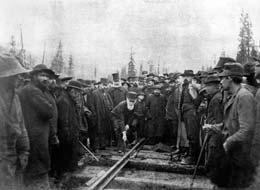Seeking out the forgotten birthplace of British Columbia

Shachi Kurl,
Special to The Post
Along a lonely, winding stretch of the Trans-Canada Highway, past Sicamous and prior to that last turn towards Revelstoke, there is a place forlorn and forsaken, its significance hardly reflected by its physical location.
It is Craigellachie BC. The place where the Last Spike was driven into the Canadian Pacific Railway in 1885, sealing the big promise that brought British Columbia into confederation, ending more than a decade of political uncertainty and enabling us to celebrate BC Day as we are doing this weekend, from the comfort of our hammocks or sofas.
Famous for a staged photo featuring men in top hats doing the work of labourers, Cragellachie is easy to miss – I nearly did, twice, forcing a tricky U-turn on a roadtrip to Banff a few years ago. A small sign hints at a place of historical interest. But on the day I discovered it, no one else was there to read the commemorative plaque, admire the cairn, or pop into the deserted gift shop where one can purchase small locomotives, if one wished to.
The impromptu visit stirred locked away memories of Grade 5 social studies classes, watching what felt like years of an adapted Pierre Berton mini-series on the railway saga containing more questionable acting and melodrama than ten-year-olds would ever be able to appreciate. But my teacher, Russ MacMath, must have made it entertaining enough to pound into our heads that the decision for what was then the Colony of British Columbia (established August 2, 1858) to do a deal with Ottawa was as much about the romantic nation-building notions of uniting Canada from coast-to-coast as it was about getting BC out of a financial pickle. (Sound familiar, HST activists?)
With the economic good times of the Gold Rush turned to brass, and as the US rattled its sabres and talked of annexing BC in the 1860’s, the deal to build a railroad and absorb BC’s massive debt burden was enough to convince members of BC’s Confederation League to come to terms. Negotiators included three future BC premiers: Amor De Cosmos, John Robson, and Robert Beaven.
But if they were congratulating themselves at the time, their work would be left incomplete for nearly 15 years.
For a while, it looked like the railway might never be completed. The so-called Pacific Scandal saw allegations that railway building contracts were given in return for political favours (sound familiar, BC Rail conspiracy theorists?). It sunk Prime Minister Sir. John A. Macdonald and his Conservatives at the ballot box. Liberal PM Alexander Mackenzie was no fan of the railway, and called the terms under which this province had come into Canada “impossible”. It makes me wonder if this first general election was where the federal Liberals lost BC once and for all.
But for the return of a gin-loving Macdonald to political power, and the lives of scores of Chinese migrant workers who gave their lives blasting through BC’s unforgiving mountain terrain, I wondered what might have become of BC. Might we have wound up Americans?
I also wondered at our own seeming lack of a sense of history or respect for deserted Craigellachie.
Where were the tour buses? Where were the guides? If this were China, I thought, it would be teeming with picture takers.
Indeed, I might guess that as many Chinese visitors have shuffled on guided tours through the hallways of the BC Legislature in Victoria this summer as visitors from our province.
It is that they care more about monuments and places of historical significance in their own country and abroad than we do as British Columbians? Not so, says Kenny Zhang, Senior Research Analyst at the Asia Pacific Foundation in Vancouver.
He points to a combination of factors. For example, Chinese visitors flock to Gravenhurst, Ontario, the home of Dr. Norman Bethune, the medical pioneer who is a hero in China. But Zhang says much of a Chinese tourist’s travel itinerary abroad is decided by marketing to tour operators, not some sense of historical obligation.
Zhang says the emerging class of Chinese visitor to Canada, or anywhere else in the world, is relatively new to international travel.
“They are taken to monuments. They are taken for lunch, and for shopping,” he says. It’s all new to them. Perhaps not unlike the way North Americans, newly mobilized by affordable cars and a road system, spent vacations driving themselves anywhere, stopping for lunch, and driving back.
That made me feel a bit better about things. Perhaps as British Columbians we’re doing as good a job honouring our province at backyard barbeques and in the great outdoors this weekend.
But should you find yourselves on the Trans-Canada Highway, heading to Golden to golf, or to Salmon Arm for some fishing, see if you can slow down enough to make a sharp turn at Craigellachie and stop for a moment to think on the country our founders forged out of fiscal practicality, back breaking hard work, a hint of scandal, and a splash of gin.
I think we’ve done alright.
Happy BC Day.
Shachi Kurl is Vice President of Angus Reid Public Opinion.
Leave a comment









